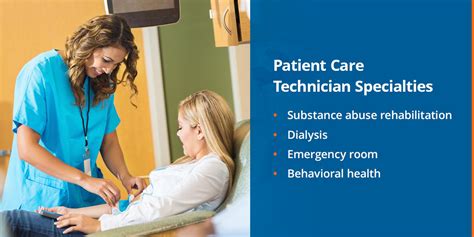Patient care technicians play a vital role in emergency room settings, providing essential support to healthcare professionals and ensuring the smooth operation of the department. As the first point of contact for patients and families, patient care technicians are responsible for creating a welcoming and reassuring environment, while also performing critical tasks that aid in diagnosis, treatment, and patient care.
The emergency room is a fast-paced and dynamic environment that requires patient care technicians to be adaptable, flexible, and able to think critically. In this article, we will explore the essentials of patient care tech in emergency room settings, including the skills, knowledge, and qualities required to excel in this role.
The Role of Patient Care Technicians in Emergency Room Settings
Patient care technicians work under the supervision of nurses and physicians to provide direct patient care, perform medical procedures, and maintain a safe and clean environment. Their duties may include:
- Taking vital signs, such as temperature, pulse, and blood pressure
- Collecting and labeling specimens for laboratory testing
- Assisting with medical procedures, such as phlebotomy and electrocardiograms
- Providing basic care, such as bathing, dressing, and feeding patients
- Maintaining patient confidentiality and dignity
- Communicating effectively with patients, families, and healthcare professionals
Essential Skills and Knowledge for Patient Care Technicians
To succeed as a patient care technician in an emergency room setting, individuals should possess the following essential skills and knowledge:
- Communication skills: Effective communication is critical in emergency room settings, where patients and families may be anxious or distressed. Patient care technicians must be able to communicate clearly, concisely, and compassionately.
- Medical terminology: Patient care technicians should have a basic understanding of medical terminology, including abbreviations and acronyms commonly used in emergency room settings.
- Vital sign measurement: Accurate measurement of vital signs, such as temperature, pulse, and blood pressure, is crucial in emergency room settings. Patient care technicians should be skilled in using various devices, such as thermometers and blood pressure cuffs.
- Infection control: Patient care technicians must adhere to strict infection control protocols to prevent the spread of disease and maintain a safe environment.
- Basic life support: Patient care technicians should be certified in basic life support (BLS) and be able to respond to cardiac emergencies.
Qualities Required for Success
In addition to essential skills and knowledge, patient care technicians should possess certain qualities to succeed in emergency room settings, including:
- Compassion and empathy: Patient care technicians should be able to provide emotional support and reassurance to patients and families in crisis.
- Attention to detail: Accurate measurement of vital signs, collection of specimens, and performance of medical procedures require attention to detail and a high level of accuracy.
- Ability to work under pressure: Emergency room settings can be chaotic and fast-paced, requiring patient care technicians to remain calm and composed under pressure.
- Teamwork and collaboration: Patient care technicians work closely with nurses, physicians, and other healthcare professionals to provide comprehensive care. They should be able to communicate effectively and work collaboratively as part of a team.
Challenges and Opportunities
Patient care technicians in emergency room settings face numerous challenges, including:
- High-stress environment: Emergency room settings can be chaotic and stressful, requiring patient care technicians to remain calm and composed.
- Heavy workload: Patient care technicians may be responsible for caring for multiple patients simultaneously, requiring them to prioritize tasks and manage their time effectively.
- Limited resources: Emergency room settings may have limited resources, requiring patient care technicians to be creative and resourceful in their work.
Despite these challenges, patient care technicians in emergency room settings have numerous opportunities for growth and development, including:
- Variety and unpredictability: Emergency room settings are dynamic and unpredictable, providing patient care technicians with the opportunity to work with diverse patient populations and respond to a range of medical emergencies.
- Collaboration and teamwork: Patient care technicians work closely with healthcare professionals to provide comprehensive care, providing opportunities for collaboration and teamwork.
- Professional development: Patient care technicians can pursue specialized training and certification in areas such as emergency medical technology (EMT) or critical care.
Best Practices for Patient Care Technicians
To provide high-quality care in emergency room settings, patient care technicians should adhere to the following best practices:
- Stay up-to-date with training and certification: Patient care technicians should pursue ongoing training and certification to stay current with the latest medical procedures and technologies.
- Maintain accurate and detailed records: Patient care technicians should maintain accurate and detailed records of patient care, including vital signs, medical procedures, and test results.
- Prioritize patient safety and dignity: Patient care technicians should prioritize patient safety and dignity, adhering to strict infection control protocols and maintaining patient confidentiality.
- Communicate effectively with patients and families: Patient care technicians should communicate clearly, concisely, and compassionately with patients and families, providing emotional support and reassurance.

Gallery of Emergency Room Patient Care





FAQs
What is the role of a patient care technician in an emergency room setting?
+Patient care technicians work under the supervision of nurses and physicians to provide direct patient care, perform medical procedures, and maintain a safe and clean environment.
What skills and knowledge are required to succeed as a patient care technician in an emergency room setting?
+Patient care technicians should possess essential skills and knowledge, including communication skills, medical terminology, vital sign measurement, infection control, and basic life support.
What qualities are required for success as a patient care technician in an emergency room setting?
+Patient care technicians should possess qualities, including compassion and empathy, attention to detail, ability to work under pressure, and teamwork and collaboration.
In conclusion, patient care technicians play a vital role in emergency room settings, providing essential support to healthcare professionals and ensuring the smooth operation of the department. By possessing essential skills and knowledge, qualities, and adhering to best practices, patient care technicians can provide high-quality care to patients and families in crisis.
